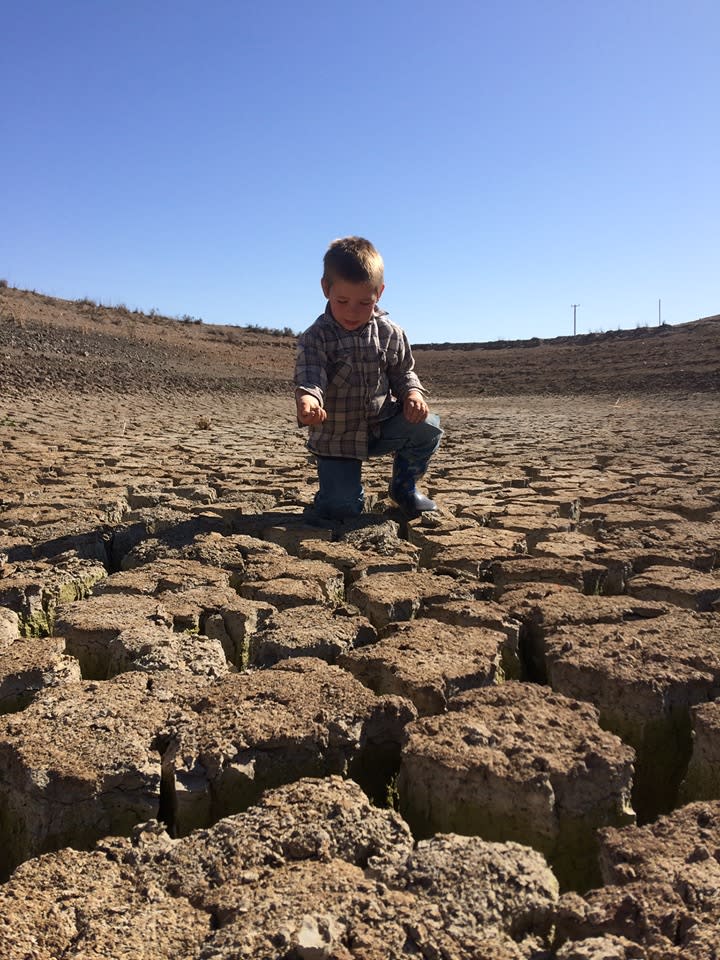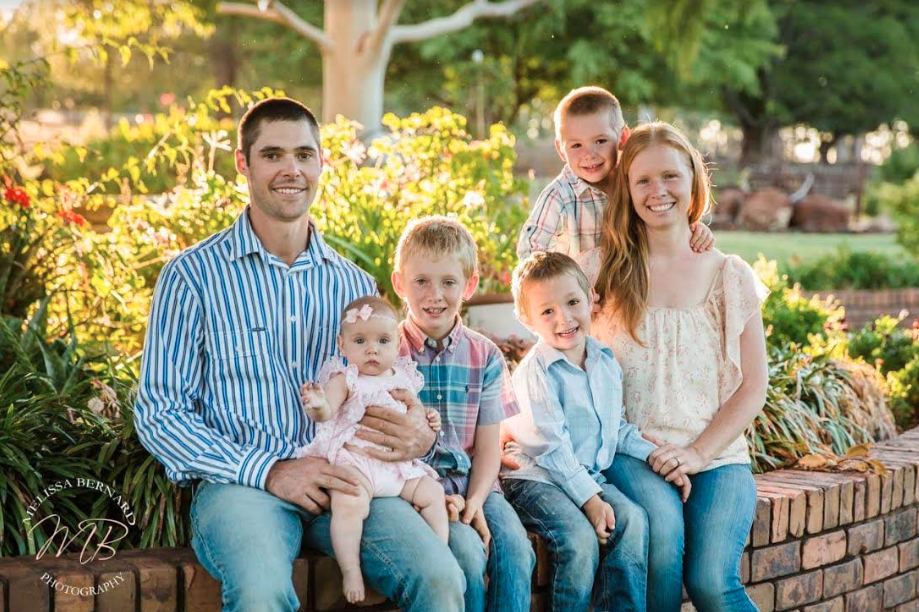The four-year-old boy who 'can't remember the sound of a thunderstorm'
Noah McArthur just turned four years old, he lives with his family on a farm near Inverell, NSW and he can’t remember the sound of rain.
Mother, Elizabeth McArthur explains a few weeks ago she took her children to go see the dam on their property, something she said she tries to do every year.
The family was shocked to see the dam was completely dry, something Mrs McArthur had never seen in her lifetime.
“It got me thinking about what this drought would feel like from a child’s perspective, so I asked my son Noah what he could remember about rain, thunderstorms and full dams,” Mrs McArthur told Yahoo News Australia.
Mrs McArthur explained that because he was born and has grown up during one of the state’s most-severe ever droughts, her son couldn’t remember the sound of rain hitting the roof, the the sound of a thunderstorm, nor could he remember the sight of a full dam.

Mrs McArthur said it dawned on her, Noah had never seen their farm during a “good season”.
“The drought has been affecting us personally for about two years, but it’s the last 6 months that things have intensified,” Mrs McArthur explained.
Drought brings on ‘feeling of helplessness’
Mrs McArthur’s husband, Andrew, is a farmer and shearer and she said there’s been a lot less shearing for Andrew to do.
While Mrs McArthur is a teacher, she is currently at home with her kids - three boys aged eight, five and four and a baby girl aged 11 months - so Mr McArthur’s shearing is their main source of income.
The McArthur’s lucerne has died due to the lack of rain and the oats crop was used to feed the sheep, when usually they sell it.
Throughout the winter they sell firewood, but this past winder they sold a quarter of what they usually do.
“The rural communities are hurting, and the flow-on effect is becoming evident to all,” Mrs McArthur said.
“Money is very tight for a lot of people, and things like firewood almost become a ‘luxury’ item. We have had many businesses close in our town because feeding livestock must come first over a haircut, a coffee date or in some cases even adequate groceries.”
Mrs McArthur explained if the drought continues, her biggest concern is water. Their home’s rain water tank dried up long ago and for most of this year, water has been trucked in.
“Many people are suffering badly, struggling to feed their stock and families. There is no money for holidays, and even if there was, animals need to be fed and checked daily so it’s impossible to get away,” Mrs McArthur said.
“As well as financial suffering, there is a feeling of helplessness. Looking out the window and seeing nothing but dead grass, dry paddocks and scorched earth makes a hard situation so much worse.”
‘Kids understand more than we realise’
Mrs McArthur explained her kids are aware of the situation, discussions of farming life happen all year round, regardless of the season. The McArthur kids have grown up on the farm, and they come from generations of farmers of both sides of the family.
“They understand life and death, drought and flood because they see it playing out before their eyes every day,” Mrs McArthur said.
Mrs McArthur said she needs to explain to her children why it is necessary to be more conservative with water in dire times. She said she has had discussions with her kids about the flow-on effects of drought - like why the price of food goes up - so food doesn’t go to waste.
“Kids understand far more than we realise, because they are very observant! I’m not sure that they fully understand the entire situation, but they always take things in their stride and adapt as time goes on,” she said.

While she has no doubt the current and future generations of farmers in Australia will rise to the occasion, Mrs McArthur did admit the current situation is worrying and says the effects of this drought will be “seen for years to come”.
But she has hope for her children.
“Hardship builds resilience, and our kids will be stronger and wiser because of this drought.
“There have been terrible droughts in the past, and we as Australian’s have always recovered and prospered again.”
Farmers struggling under ‘immense pressure’
Mrs McArthur said she has seen a lot of talk online, with people blaming farmers for their hardships, saying good preparation could have prevented the “devastating turn of events”.
“Regardless of individual farming practices, every farmer in our district, and across every district that is affected, is struggling under immense pressure,” Mrs McArthur said.
The towns that could run out of water in months, as 'day zero' looms
Harrowing story behind photos of starving cattle on drought-stricken land
'Most severe drought in history' sparks water restrictions in region for first time in 25 years
“It is true that some hard lessons have been learnt, but at the end of the day every dam is drying up, every animal is struggling to survive, many native trees are now showing signs of stress like I’ve never seen.”
After three years of dismal rain, Inverell mayor Paul Harmon told ABC radio stocks, pastures and forests were rapidly dying in the area.
"We are really starting to see our community struggling," Mr Harmon said, according to AAP.
"Not only just our farming community, but now going right through our whole communities, through our retail and also those services that provide services for our rural communities."

Mr Harmon said Inverell has less than 10 per cent inflow into the catchments for the town’s water supply.
Inverell has already received one round of funding for drought-stricken communities, and is now hoping for a second Commonwealth cash injection.
“Without life-giving rain nothing can grow, nothing can survive,” Mrs McArthur said.
“We all rely on our agriculture industry for the food we eat. This affects everyone. Farmer’s need a listening ear and practical support to make it through this - the worst drought we have ever seen.”
Mrs McArthur suggests donating to genuine organisations which help farmers - like the Rural Aid campaign Buy a Bale, or sending shopping vouchers for local businesses, food hampers or even a friendly letter to show farmers aren’t alone can go a long way.
She also says buying Australian-made items or even hosting a fundraiser at home or work can help.
However, Mrs McArthur says the best way for people to fully grasp what farmers are doing is to go to a country town - to see the toll of the drought first-hand and of course, help the local economy.
“Shop in the local shops, stop and give some encouragement and help to keep the economy going. Above all, pray for drought-breaking rain soon!” Mrs McArthur said.
Do you have a story tip? Email: newsroomau@yahoonews.com.
You can also follow us on Facebook and Twitter, download the Yahoo News app from the App Store or Google Play and stay up to date with the latest news with Yahoo’s daily newsletter. Sign up here.



